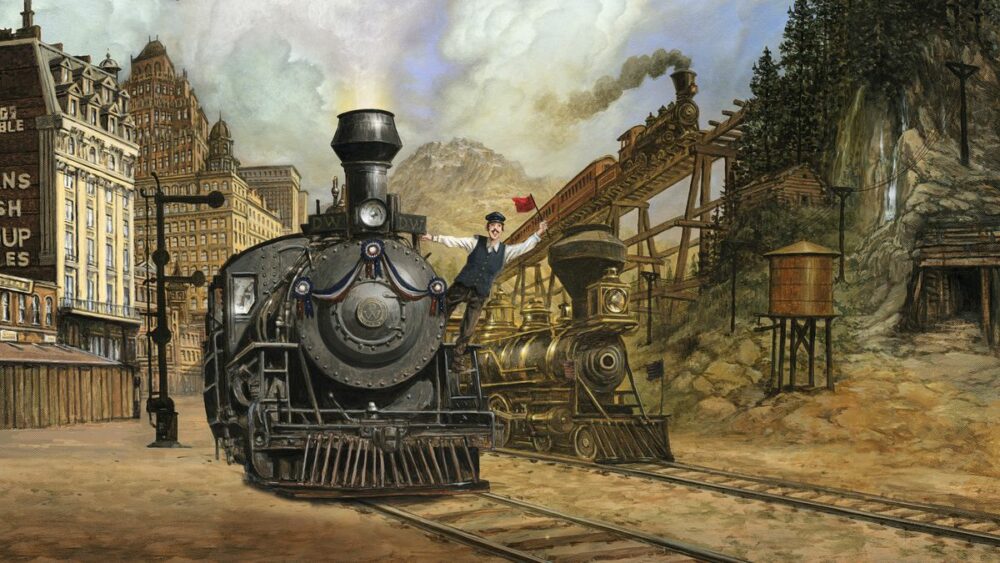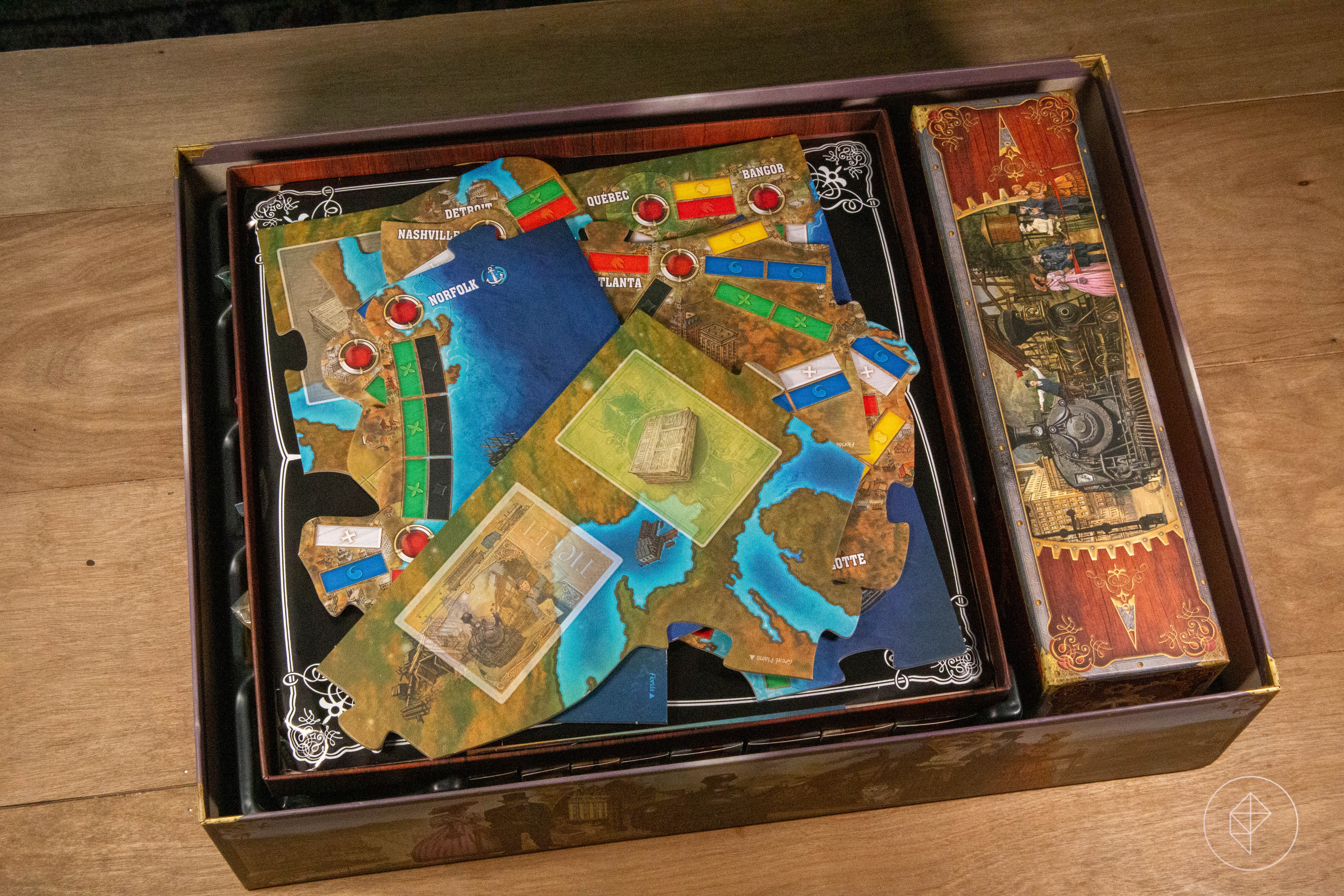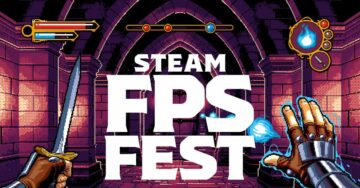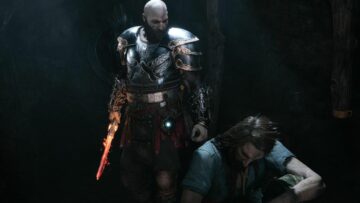Ticket to Ride Legacy: Legends of the West brings together a powerful trio of award-winning designers — the original creator of Ticket to Ride, Alan R. Moon; the creator of Pandemic, Matt Leacock; and the inventor of the legacy genre of board games, Rob Daviau. Together, after five long years of development, these men have achieved something remarkable. Ticket to Ride Legacy is nothing less than the reinvention of the classic board game first released in 2004, and likely the start of a whole new franchise for its owner, board game giant Asmodee.
Moreover, it was accomplished without the slavish attention to historical detail so common in modern economics-themed board games — a niche format with a penchant for fetishizing raw capitalism above all else. In its place are the beginnings of a joyful and fantastical new world, one that I can’t wait to explore further with my friends and family.
To perform this feat, Legends of the West employs a bit of a bait and switch. It begins with just a partial map of the United States of America circa 1865 — conveniently the same year that the American Civil War ended. Judging by the lay of the land, in any other game it would be time to begin the business of Reconstruction, where a generation of wealthy men with cash on hand snatched up lucrative train lines in an orgiastic display of industrial progress. And with virtually any other train-themed board game, that’s where the focus of the experience would lie: taking turns placing train lines, forcibly displacing a largely invisible Native American population already living there, all while exploiting imported labor to do it on the cheap.
So instead of retelling American history, Legends of the West tosses it right out the window.
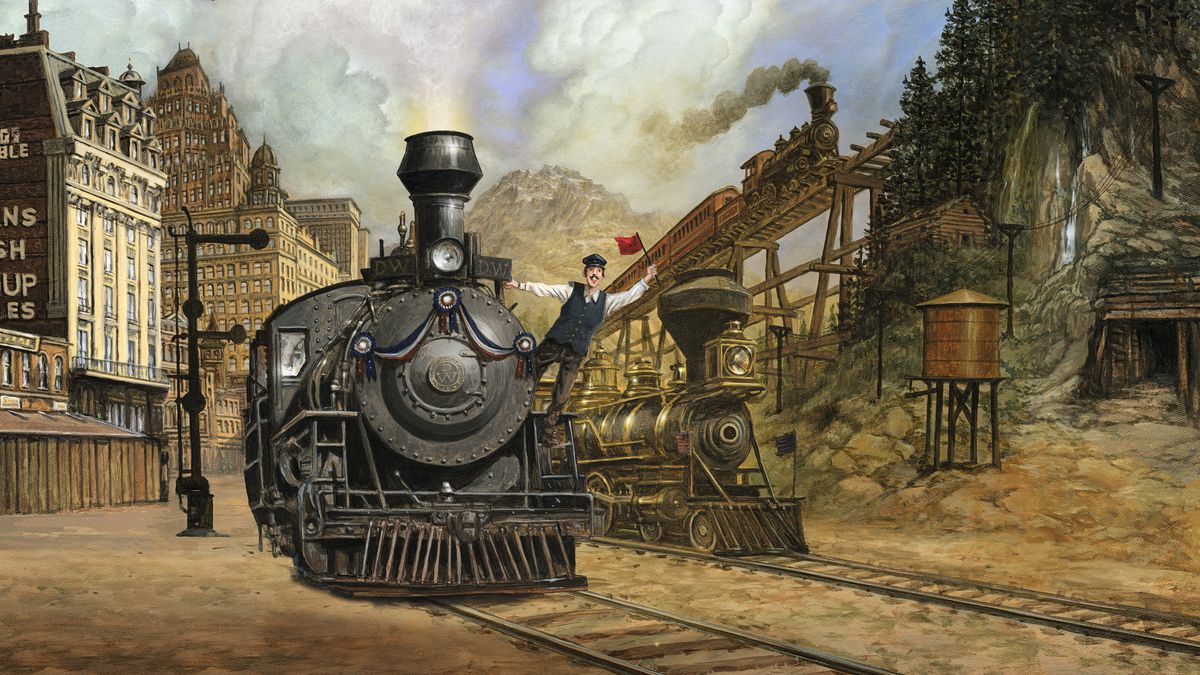
In its place is a transcontinental mystery, with players expanding outward across a landscape that, by the end of 12 linked games, displays only a passing resemblance to our United States of America and portions of its nearest neighbors. Legends of the West is, in all seriousness, an elaborate hunt to bring a meddlesome murderer to justice. And while that narrative hook is only paper thin, it’s just enough of a distraction to hang a lampshade on a hugely problematic chapter in our nation’s history.
And what a very nice lampshade it is, one that preserves Ticket to Ride’s excellent gameplay and reinforces the train-positive themes at its core.
Anyone who has played Ticket to Ride knows that it’s just a simple card game where players try to lay down matching sets of colored cards to earn points. The secret to its success is in turning those cards into train cars, and those matching sets into train lines, and then adding a map that requires strategic planning to navigate. You need to connect Chicago to New Orleans before your neighbor does, because a secret ticket card sitting in your hand will pay off handsomely if you’re able to. Tallying up those tickets at the end of the game determines who wins, and the same is true here… for the most part.
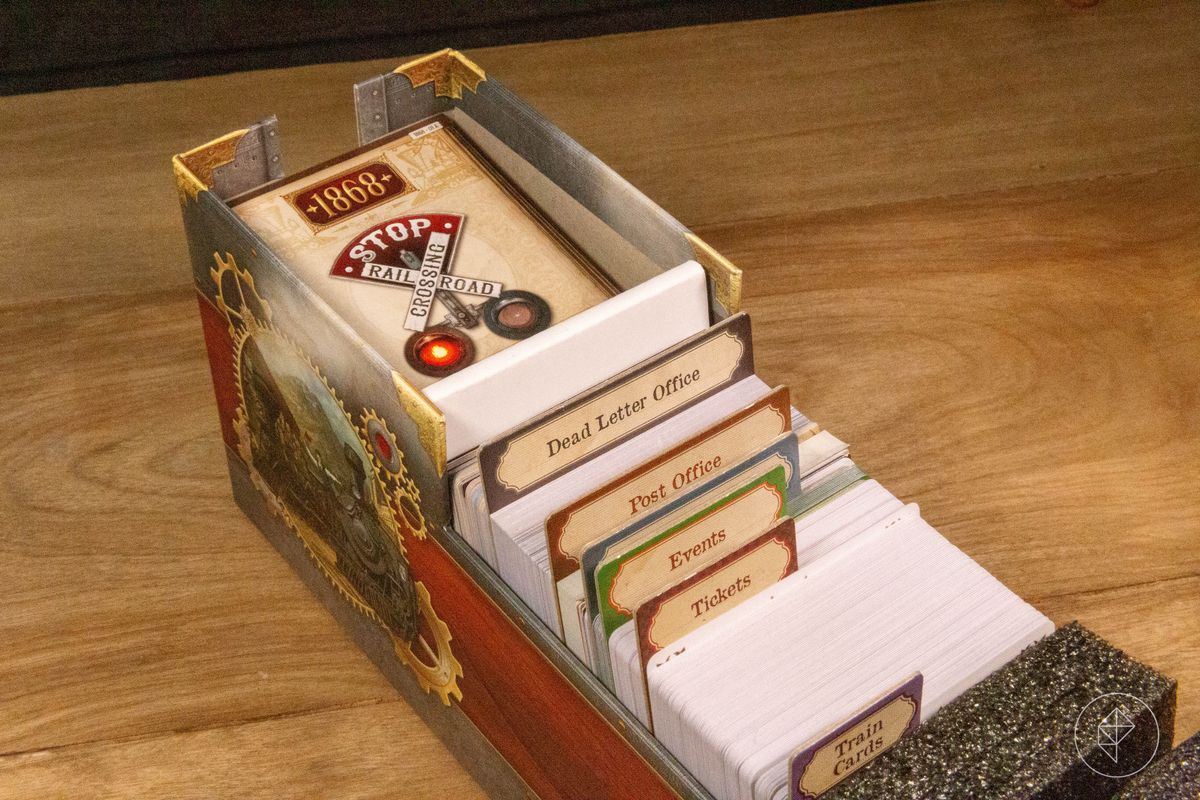
But, in classic legacy game style, players will open up a new package of rules and board game bits every time they sit down at the table, slowly growing the scope and scale of the game. Legends of the West succeeds by doubling down on the familiar, train-positive theming of the original. Its secret enclosures feature several smaller train-themed minigames and other goodies that complement its core loop, but never distract from it. In this way, Daviau, Leacock, and Moon also show incredible restraint. They never overcomplicate things, and their reinterpretation of Ticket to Ride is still the same chilled-out, lean-back experience that you can enjoy while making small talk with the neighbors.
![Designers’ Note: [...] This game leverages [railroad tropes] to tell a story [...] But American expansion came at a cost. Native American tribes were dispossessed and killed. Railroad laborers were exploited, mistreated, and injured. While designing this experience, we found no way to include these elements within the lighter theme of the game. These omissions are not meant to conceal or gloss over these events and we encourage you to [read history].](https://platogaming.com/wp-content/uploads/2023/09/ticket-to-ride-legacy-tosses-american-history-in-the-trash-and-its-better-for-it-4.jpg)
Unfortunately, the nature of a legacy game means that’s literally all I can tell you about the secrets that appear inside the box. Any more detail would spoil the joy of discovery — and break the agreement that was required for me to review the game. Suffice it to say that you’ll have to crack the box open and explore it for yourself to learn more.
You’ll just have to take my word for it that Ticket to Ride Legacy: Legends of the West is something special. If you have ever enjoyed the franchise before, you should strongly consider picking a copy up when it finally arrives at retail. Even with a steep $119.99 price tag, you’ll absolutely get your money’s worth — and end the experience with a unique board game that is all your own.
Ticket to Ride Legacy: Legends of the West will be released Nov. 3. It was reviewed using a pre-release copy provided by Asmodee. Vox Media has affiliate partnerships. These do not influence editorial content, though Vox Media may earn commissions for products purchased via affiliate links. You can find additional information about Polygon’s ethics policy here.
- SEO Powered Content & PR Distribution. Get Amplified Today.
- PlatoData.Network Vertical Generative Ai. Empower Yourself. Access Here.
- PlatoAiStream. Web3 Intelligence. Knowledge Amplified. Access Here.
- PlatoESG. Carbon, CleanTech, Energy, Environment, Solar, Waste Management. Access Here.
- PlatoHealth. Biotech and Clinical Trials Intelligence. Access Here.
- Source: https://www.polygon.com/tabletop-games/23885707/ticket-to-ride-legacy-legends-of-the-west-review-spoiler-free
- 1
- 12
- 212
- 220
- 28
- 7
- 8
- 9
- a
- able
- About
- above
- absolutely
- accomplished
- achieved
- across
- adding
- Affiliate
- after
- Agreement
- Alan
- All
- along
- already
- also
- america
- American
- an
- and
- Another
- any
- ARE
- as
- At
- attention
- award-winning
- back
- background
- BE
- because
- before
- begin
- behind
- BEST
- Better
- Bit
- Black
- board
- board game
- Board Games
- Box
- break
- bring
- brings
- business
- but
- by
- came
- CAN
- capitalism
- card
- card game
- Cards
- cars
- Cash
- chapter
- Charlie
- Cheap
- chicago
- Circa
- cityscape
- civil
- Classic
- colorful
- commissions
- Common
- complement
- components
- conceal
- conductor
- connect
- Consider
- content
- Core
- cost
- creator
- days
- designers
- designing
- detail
- Development
- discovery
- divided
- do
- does
- doubling
- down
- Earn
- easy
- Editorial
- Elaborate
- elements
- else
- encourage
- end
- ended
- enjoy
- enjoyed
- enough
- ethics
- even
- events
- EVER
- Every
- everything
- expanding
- expansion
- experience
- exploiting
- explore
- false
- familiar
- family
- fantastical
- far
- feat
- Feature
- Finally
- find
- First
- five
- Focus
- For
- format
- Franchise
- Friends
- from
- further
- game
- gameplay
- Games
- Gaming
- generation.
- Get
- giant
- Growing
- hand
- has
- Have
- here
- him
- Historical
- history
- Hook
- http
- HTTPS
- hugely
- hunt
- i
- if
- in
- include
- Included
- incredible
- industrial
- influence
- information
- INSIDE
- instead
- into
- Is
- IT
- ITS
- jpg
- just
- Justice
- knows
- labor
- Land
- landscape
- largely
- lay
- LEARN
- legacy
- Legends
- less
- leverages
- lie
- likely
- Line
- lines
- linked
- links
- living
- Long
- lucrative
- Making
- manual
- map
- matching
- May
- me
- means
- meant
- Media
- Men
- model
- Modern
- Moon
- more
- most
- my
- Mystery
- narrative
- native
- Native American
- native american tribes
- nature
- navigate
- neighbors
- never
- New
- New Orleans
- new world
- Newsletter
- Nice
- Niche
- no
- not
- notes
- nothing
- novel
- of
- off
- older
- on
- One
- only
- open
- or
- organized
- original
- orleans
- Other
- our
- out
- OUTWARD
- over
- own
- owner
- package
- Paper
- part
- partnerships
- passing
- Patch
- patch notes
- Pay
- perform
- photo
- picking
- place
- placing
- planning
- plato
- plato data intelligence
- platodata
- platogaming
- played
- players
- Points
- policy
- Polygon
- population
- powerful
- price
- Products
- Progress
- provided
- purchased
- R
- Raw
- read
- reinforces
- released
- remarkable
- removed
- required
- requires
- retail
- reveal
- review
- Ride
- right
- rob
- roundup
- rules
- same
- say
- Scale
- scope
- Secret
- secrets
- sets
- several
- should
- show
- side
- sign
- Simple
- Sit
- Sitting
- small
- smaller
- So
- something
- special
- start
- States
- Steam
- still
- stored
- Story
- storyline
- Strategic
- strongly
- style
- success
- Switch
- table
- tag
- Take
- taking
- talk
- tallying
- tell
- than
- thanks
- that
- The
- The Game
- their
- Them
- theme
- themes
- then
- there
- These
- they
- things
- this
- those
- though
- Ticket
- Ticket to Ride
- tickets
- time
- to
- together
- Train
- tribes
- trio
- true
- try
- turning
- turns
- unique
- United
- United States
- UNITED STATES OF AMERICA
- unlikely
- up
- using
- very
- via
- W3
- wait
- war
- was
- way
- we
- wealthy
- weekly
- were
- West
- What
- when
- where
- while
- WHO
- whole
- will
- window
- Wins
- with
- within
- without
- world
- worth
- would
- XML
- year
- years
- you
- your
- yourself
- zephyrnet
